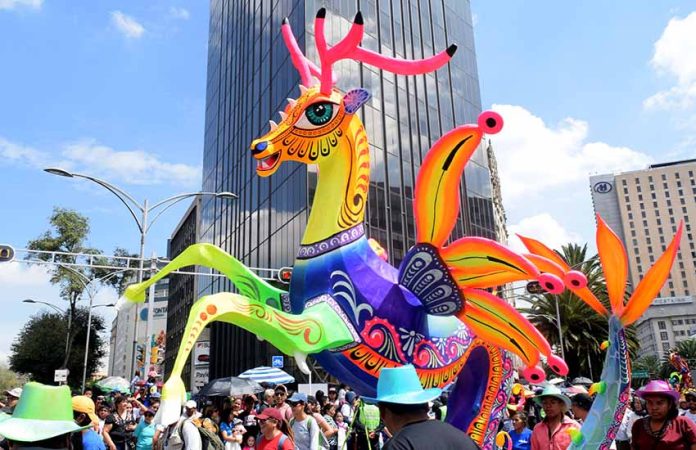So, you’re visiting here, or recently moved to Mexico, and you finally have the chance to experience Day of the Dead in the country where it originated, but what if you don’t know where to find the celebrations?
Firstly, you should know that there are actually different kinds of celebrations of Day of the Dead. The most important distinction is between those that are traditional, based on centuries and even millennia of tradition, and those done for entertainment.
Many of the latter have gained popularity and even were invented in only the past decades. The situation can be compared to Christmas in the United States, where you have religious celebrations of the birth of Christ – and Santa Claus marching in parades.
Because of the variety, let me go out on a limb here and recommend Mexico City as a template for Day of the Dead celebrations. Why? Because you can find both kinds of Day of the Dead celebrations in abundance in the nation’s capital.
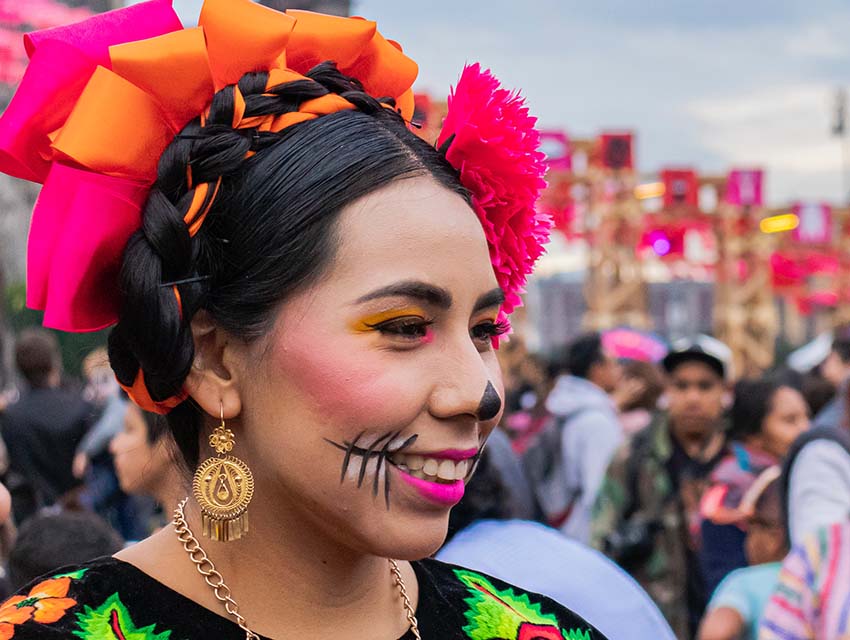
Tradition is not only found in homes, businesses and local cemeteries but also in museums, cultural centers and more, where representations of Day of the Dead traditions from other parts of Mexico can be found.
The public entertainment side is huge and widely varied.
The iconic family altars (ofrendas) traditionally made for dead loved ones are everywhere in Mexico City. Every plaza, public building and even many businesses have at least one that you can easily visit and take pictures of. They range from the purely traditional (check out the ones in local markets) to massive displays, often with themes or social messages.
The most important of the monumental ofrendas are located in the zócalo and another in Santo Domingo just to the north. Set up by the city and the National Autonomous University respectively, both take over their respective plazas entirely.
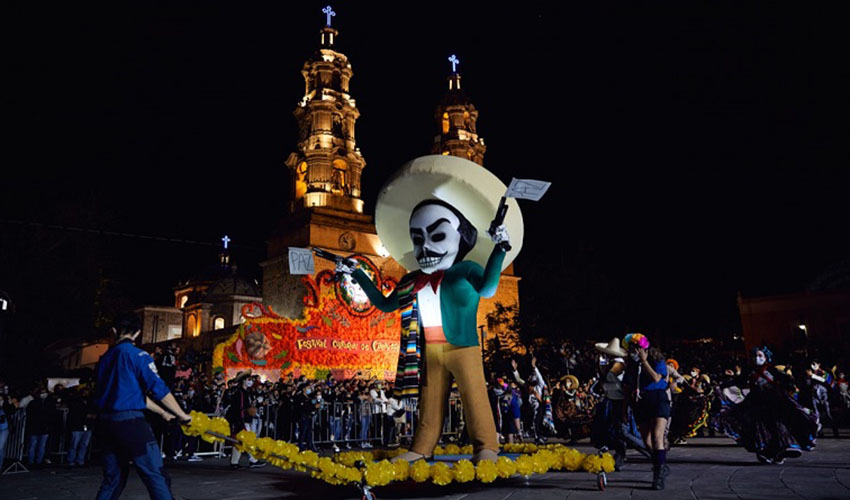
Most of Mexico City’s cemeteries are located on the periphery, with the one in Mixquic being the most famous for Day of the Dead. Because of Mixquic’s distance (and Mexico’s City’s infamous traffic), you may wish instead to visit San Fernando or Dolores, which have the resting places of many of Mexico’s historic figures.
Thanks to the 2015 James Bond film Spectre, Mexico City’s popularity as a Day of the Dead destination has exploded. The parade in the movie’s opening scene was fictitious at the time, but city authorities made sure that there would be a real one for 2016. That move generated some controversy, but the city had already been creating new and larger Day of the Dead events for many years.
Mexico City’s Day of the Dead “season” kicks off with the annual Alebrije Parade and the Mega Catrina Procession about a week before, both of which fill Reforma avenue with gigantic colorful monsters and people in elaborate makeup and 19th-century costumes respectively.
The canals in the south of the city also host a unique theater production of La Llorona, the legend of the wailing woman who drowned her children and as a ghost forever wandered Mexico looking for them.

Just about all of the many museums and cultural centers in Mexico City do something related to the holiday that will range from educational to pure entertainment. Recommended places to check out include the Museum of Anthropology, the Frida Kahlo Museum, the National Museum of Popular Cultures, Folk Art Museum (Museo de Arte Popular) and the Dolores Olmedo Museum for its highly-regarded monumental altar.
Mexico City has the advantage of having the infrastructure for the huge crowds that show up for the city’s annual events. Even at this late date, there are some accommodations available, but make absolutely sure you have reservations before you go because Mexico City is now one of the country’s main Day of the Dead destinations. Don’t count on just finding a hotel once you get there.
If you’re not located in Mexico City or inclined to travel there, all of Mexico’s other sizable cities will also offer traditional Day of the Dead events and public entertainment. You can see altars and skeletal figures and eat traditional pan de muerto (literally, bread of the dead).
Most of these events will have a local or regional flair to them. This is especially true in places like Oaxaca and San Cristobal de las Casas. One very large Day of the Dead celebration often overlooked in English-language articles is the Festival de Calaveras (Festival of the Skulls) in the city of Aguascalientes. It has a massive parade that existed long before the Bond movie.
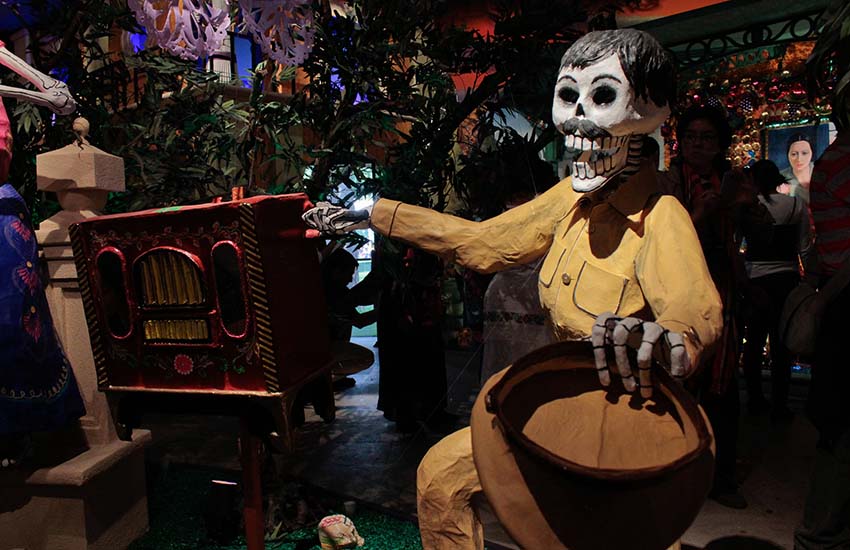
Those looking for a folkloric experience generally migrate to smaller towns in more rural areas. The most famous is, by far, on and around Lake Pátzcuaro in the state of Michoacán. Welcoming the dead on candlelight boats and all-night vigils brings tens of thousands of visitors to the municipalities of Pátzcuaro, Janitzio and other communities on the lake.
Although Pátzcuaro is no stranger to tourism, the accommodations infrastructure there is currently stretched to the maximum for the holiday, and the streets are filled to the brim. As of this date, I found only a handful of places with availability, and at exorbitant prices, so again, plan before you go.
This is, in fact, a good policy to follow if you’re going to travel to visit any of the most popular of Mexico’s Day of the Dead events. Also, a good idea is booking a tour to see the most popular of the events. Many other small towns near larger cities like San Cristóbal, in the state of Chiapas, have similarly ancient rites. Just investigate what the restrictions may be.
A tour is often your best bet to find out where you can go and when, since Mexico is typically not very good at publicizing event calendars, usually because planning is often not finalized until very close to the event.
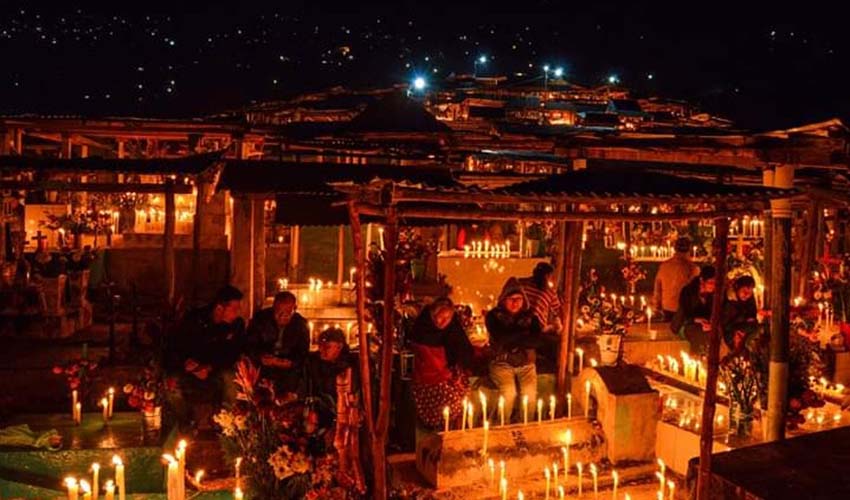
Research what you can online in local newspapers and tour advertisements, and local city and town Facebook groups can also be your friend if you can read Spanish. Your best bet is to come several days before Nov. 2 (although this year, many places — but not all — are holding festivities on Oct. 29 because of the weekend). Nov. 2 is normally when most, if not all, events will occur.
Ask around for event information in places like tourism stands and hotels, especially if you don’t know Spanish.
Below are some suggestions to get you started. Be aware that as noted above, the planning of events is finalized late and may be subject to last-minute changes, so it’s a good idea to check the site you got your information from again on the day before.
- México es Cultura (type in Día de Muertos)
- Mexico City’s Day of the Dead parade
- Day of the Dead Oaxaca city celebration Facebook page
- Day of the Dead events in the state of Jalisco
- Day of the Dead Parade in Guadalajara
- Day of the Dead in Todos Santo in Baja California
- Day of the Dead in Sayulita in the state of Nayarit
- Festival de las Ánimas in Mérida
- Day of the Dead Guide for Puerto Vallarta
- La Calaca Festival in San Miguel Allende
Leigh Thelmadatter arrived in Mexico 18 years ago and fell in love with the land and the culture in particular its handcrafts and art. She is the author of Mexican Cartonería: Paper, Paste and Fiesta (Schiffer 2019). Her culture column appears regularly on Mexico News Daily.
